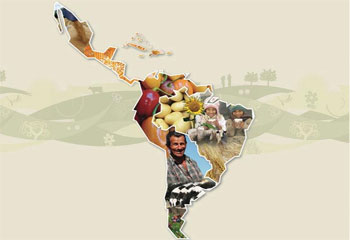Nations from Latin America and the Caribbean submitted nearly 100 proposals to the Marketplace platform, calling for innovation in areas such as productivity, natural resource management, institutional modernization and poverty alleviation.

Brazil, March 23, 2012 (IICA). Seventeen countries submitted 99 proposals in response to the call issued by the Latin America-Caribbean-Brazil Platform for Innovation in Agriculture (known as Marketplace) for projects intended to improve living conditions for small-scale farmers in the region.
The Brazilian Agricultural Research Corporation (EMBRAPA) and the Inter-American Institute for Cooperation on Agriculture (IICA) launched the Marketplace Platform initiative in March 2011.
Argentina, Costa Rica, Colombia, Cuba and Peru submitted the most projects, which focused on:
• Technologies to increase productivity
• Improved management of natural resources
• Strengthening policies, institutions, markets and knowledge management, and
• Technologies to help small-scale farmers and reduce poverty.
IICA and EMBRAPA will study the 99 proposals and select those that are most innovative and will contribute the most to making agriculture competitive and sustainable. A US$500,000 fund has been established to finance the initiatives selected.
The Marketplace platform also receives support from organizations such as the Ministry of Science, Technology and Innovation (MCTI), the International Fund for Agricultural Development (IFAD), the Brazilian Cooperation Agency (ABC) of the Ministry of Foreign Affairs (MAE), the International Center for Tropical Agriculture (CIAT), the UK Department for International Development (DFID), the Inter-American Development Bank (IDB) and the United Nations Food and Agriculture Organization (FAO).
The Marketplace platform is an offshoot of the Africa-Brazil platform, a joint initiative launched in 2010 by EMBRAPA and the Forum for Agricultural Research in Africa (FARA).
This year, this platform received 140 proposals from 23 African nations, an increase of almost 100% over the 80 proposals submitted in 2010. The initial fund of US$800,000 allocated to finance initiatives has now grown to US$1.2 million.
For more information, contact:
fernanda.tallarico@iica.int











